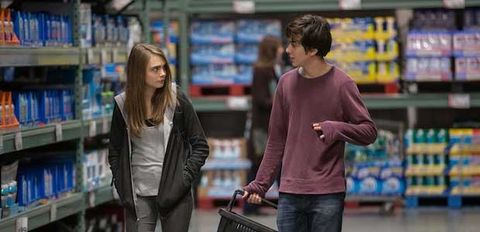As Quentin (Nat Wolff) explains in Paper Towns, an actual “paper town” is not a real city, but instead a fake one placed on maps to protect against copyright infringement. The adaptation of John Green’s story attempts to broaden its scope by using this as a metaphor for the people living in the suburban (and fictional) Jefferson Park within Orlando, Florida. No one cares about anything that really matters, and Margo (Cara Delevigne) is an example of how people have their own image of reality. But, underneath it all, everyone is just paper. There’s something poetic about this mission of director Jake Schreier's Paper Towns, but it too is mostly just paper. And yet, it’s also a pretty piece of paper.
We’ve seen a number of great films over the years that attempt to capture the experience of moving on from high school. It’s a time when seniors are anxious for the future: anxious over everything left unsaid, anxious for all those high school goals left unaccomplished, and just, generally, anxious. Adapted by Scott Neustadter and Michael H. Weber, Paper Towns tackles this moment through the eyes of Quentin, aka Q. He’s been obsessed with his adventurous dreamer of a next-door neighbor, Margo, since the two were childhood friends. They grew apart, but one night Margo climbs through Q’s window and asks for his help in taking revenge on her cheating ex-boyfriend and backstabbing friends. It’s a wild night Q will always remember, but the next morning he finds that Margo has vanished.
This is not the first time Margo has gone off without notice, as is apparent by how little her parents care about her disappearance; they don’t even bother filing a missing person’s report. Putting this odd detail aside for a moment, she’s known for leaving clues behind, and when Q discovers them, he sees a “call to action” to go and find her. Though the destination isn’t as interesting as one would like it to be, the journey takes Q on a mission with his two best friends, Ben (Austin Abrams) and Radar (Justice Smith). These guys have never gone to a party, never skipped a class and never gotten in trouble. At one point, Q remarks that this experience marks a lot of firsts for them, while the rest of his fellow graduates are experiencing their lasts. In that sense, Paper Towns is relatable; we all have experiences that can be replayed in the back of our mind to connect with these characters. But, much like how Margo sees everyone else, we’re projecting our own ideas of this journey onto the film, while the whole experience does not dig as deep into its themes as well as it could.
I cannot speak to the Paper Towns book, but the film has two main ideas: taking advantage of what one has before it passes by, and this notion of false images of reality. Margo gives Q a look inside a world he has never experienced, while Q and his fellow classmates have a false Mean Girls-esque sense of who Margo actually is. It’s along the lines of, “I hear she performs on Broadway in New York,” and, “I hear she teaches surfing lessons in Hawaii.” These themes make the road trip fun, as the boys and the two girls that tag along for the ride discover what really matters. But for a film that seeks to undercover the honesty within its characters, there are few truly honest moments. One of them involves Margo’s friend Lacey, who tags along for their inevitable road trip to find Margo out of worry (note that she, having known Margo since they were little, is more concerned with her friend’s well-being than the parents). When parked on the side of the road, Q’s buddy Ben tells Lacey that Margo doesn’t deserve her as a friend. If only there were more moments like this that spark authentic emotional reactions. Instead, we more often than not get more blaze characterizations, like Margo’s parents and Margo herself, who, despite all her preaching, does not recognize the people in her life who actually matter, like Lacey. Then there Ben and Radar, who rarely pause to reveal their actual fears and desires.
Paper Towns succeeds when it’s uniquely specific. We already know the familiar comedian/poser player of the group, like Ben, but it’s refreshing to see this image stripped away, like during his aforementioned exchange with Lacey. We’ve seen awkward nerds like Radar, but it’s his fear of losing his girlfriend and his parents’ massive collection of black Santas that makes him likable. We’ve seen road trips among friends before, but it’s moments like when they’re all singing the Pokemon theme song in response to their fear that makes this particular road trip more enjoyable. But we’ve also seen films about moving onto the next step, and Schreier's film could’ve been more meaningful if it honed in on what really matters.
Most Popular




